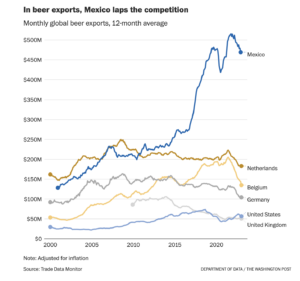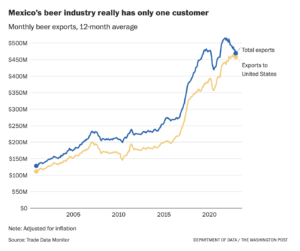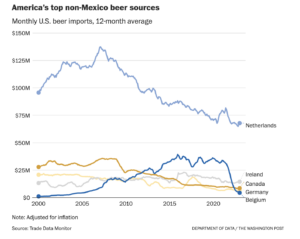May 4th, 2023
Courtesy of The Washington Post, an interesting look at Mexico’s global dominance in the beer market:
After the Great Recession, the Dutch had a solid grip on the global beer market, powered by Holland hop heavyweight Heineken. But within a decade, the Netherlands — indeed all of Europe’s hoppy heartland — would be unceremoniously thrashed by a New World upstart: Mexico.
Today, Mexico ships out more than twice as much beer as any other country and single-handedly accounts for 30 percent of the world’s entire export-beer market, according to Geneva-based trade statistics provider Trade Data Monitor. That puts Mexico far above the Netherlands (14 percent), Belgium (13 percent) and even Oktoberfest progenitor Germany (9 percent).
How in the world did Mexico pull off this brew coup?
A trail of booze clues would eventually lead us to an antitrust success story from the Obama administration. But it started, as these things often do, with market share.
The United States is the world’s largest beer importer, accounting for almost 2 out of every 5 cross-border beer dollars. About 80 percent of that money goes to Mexico. That’s up from a paltry 17 percent in the early 1990s. For Mexico, the United States has become the only market that matters. In a recent 12-month span, 97 percent of Mexican beer exports flowed north across the border.
After Mexico, America’s next-biggest sources of suds are the Netherlands, Ireland, Canada, Germany and Belgium. Until very recently, Belgium was third, but Belgian exports to the United States evaporated in 2021 as Stella Artois’s current owners, AB InBev, started brewing the ubiquitous Flemish pilsner in breweries scattered throughout these United States. (The company says it has made significant investments in U.S. breweries to ensure the beer’s quality.)
Even in an ultra-consolidated industry, AB InBev stands out as a border-and-brand-straddling colossus. Based in Belgium, it operates in almost 50 countries, owns more than 500 brands and sells something like 1 in every 4 beers worldwide. And it’s but one tentacle of 3G Capital, a Brazilian-led juggernaut that has swept up everything from Burger King and Popeyes to Kraft and Heinz foods.
3G now owns less than a fifth of the publicly traded AB InBev and plays in many other high-volume consumer businesses. But its big moves started — as many big moves do — with beer.
3G’s Brazil-born leader, Jorge Paulo Lemann, doesn’t strike us as a beer guy; he’s a onetime top-tier tennis player who reportedly doesn’t drink. But according to “The Beer Monopoly,” our guide to much of this history, he looked around Latin America, saw that many of the richest men owned breweries and realized they couldn’t all be business geniuses. It seemed much more likely that brewing was simply a money machine.
He soon bought a piece of that money machine and cranked it into high gear, gathering up major Brazilian and Argentine breweries then storming the Old World. In 2004, he went after Stella maker Interbrew and combined it with AmBev to form InBev. Four years later, he was on the march again, launching a hostile takeover of the King of Brewers, Missouri’s Anheuser-Busch.
The behemoth now known as AB InBev was officially the biggest brewer in the world, applying its formula of laying off workers, slashing costs and juicing profits in every hemisphere. But Lemann and friends weren’t satisfied. They already owned part of Grupo Modelo, which then sold the majority of the beer in Mexico. But in 2012, they launched a $20.1 billion bid to buy all of it, taking over a dominant brewer in the largest market in the Spanish-speaking world.
That global deal had serious local consequences in the United States. The Justice Department’s antitrust division was not keen on letting AB InBev add Mexico’s Corona, Pacifico and Modelo to domestic stalwarts Budweiser, Busch and Michelob. That would give AB InBev the majority of the U.S. beer trade.
U.S. regulators sued and, as part of the eventual settlement, forced AB InBev to sell Modelo’s American export business, including what is now one of the world’s biggest breweries near Piedras Negras, just across the Texas border. Conveniently, an optimal buyer was waiting in the wings.
New York-based Constellation Brands, then known for Robert Mondavi wine and Svedka vodka, had been selling Corona and other beers in the United States for years in partnership with Modelo.
“Constellation had already set up a well-working and successful import business,” said Ina Verstl, a Germany-based journalist who co-authored “The Beer Monopoly.” “All they needed were breweries in Mexico.”
The smaller American firm seized the opportunity. Then-CEO Rob Sands called the $4.75 billion deal to take full control of the United States’ Grupo Modelo business “truly transformational” and “a significant milestone in our history and participation in the beer business.”
The transformation has been as rapid as it was sweeping. Grupo Modelo beers have nigh on conquered America in a decade under Constellation, which — unlike AB InBev — had no reason to tiptoe around Bud Light’s market share. Constellation was aggressive in seeking to broaden its advertising beyond the traditional Mexican American customer base, hiring the likes of Snoop Dogg, Bad Bunny and Andy Samberg to sit on a beach hawking Corona.
Its top beer, Modelo Especial, which touts its “fighting spirit,” soon leapfrogged competitor after competitor to become America’s No. 2 beer (by dollar volume). And Modelo is on track to pass AB InBev’s crown jewel, Bud Light, as America’s rey de las cervezas by 2030, according to Bryan Roth, editor of Feel Goods Co.’s alcoholic beverage newsletter, Sightlines Plus.
“Constellation is very good at selling Mexican imports,” said beer journalist Kate Bernot, who has reported on these trends for Sightlines and contributed articles on craft beer and something called canned hard coffee to The Washington Post. “Once Americans began squeezing lime wedges into Corona longnecks, these brands became synonymous with relaxation, vacations and a bit more attitude than the standard American lagers that had dominated for decades.”
“It also doesn’t hurt that Constellation is aligned with Reyes Beer Division, the country’s largest beer wholesaler,” Bernot said. “Reyes has an especially robust sales network in California, which is not only the country’s largest beer market but is also a stronghold for Mexican imports.”
Wine and liquor are now afterthoughts in Constellation earnings calls, as about 80 percent of the company’s sales come from Mexican beer. Executives say Constellation is rapidly adding market share throughout the country, and Modelo Especial is now bigger in its California heartland than Coors Light, Miller Lite, Bud Light and Budweiser combined.
Despite a tangled ownership situation that forced regulators to use some unusual tactics, the Constellation deal has become a sparkling symbol of antitrust success: Instead of giving AB InBev the majority of the American beer market, regulators helped create a truly formidable American competitor.
And that’s why President Barack Obama’s Justice Department is (at least partly) responsible for the six-pack of Modelo in your refrigerator right now.
“The U.S. beer industry is competitive and dynamic,” AB InBev told us via email, “with more choices available to consumers than ever before.”
Focusing primarily on The New Seven Sisters - the largely state owned petroleum companies from the emerging world that have become key players in the oil & gas industry as identified by Carola Hoyos, Chief Energy Correspondent for The Financial Times - but spanning other nascent opportunities around the globe that may hold potential in the years ahead, Wildcats & Black Sheep is a place for the adventurous to contemplate & evaluate the emerging markets of tomorrow.



